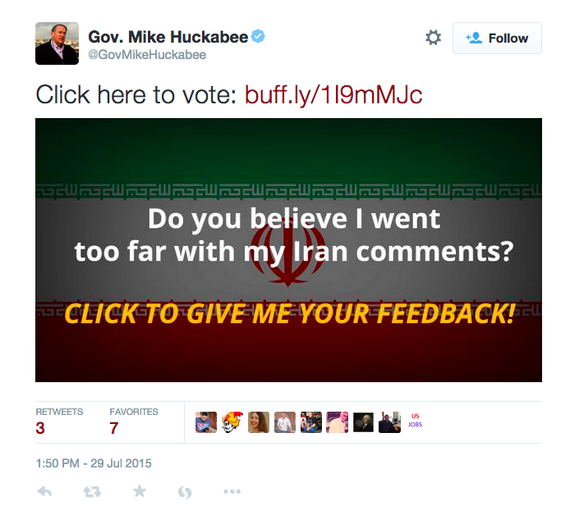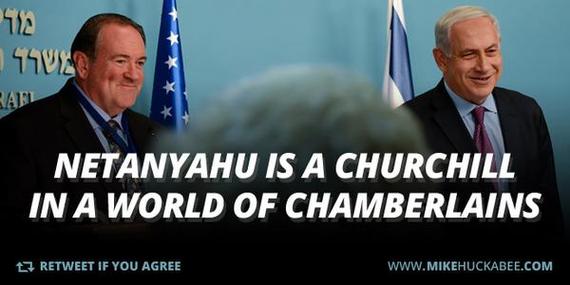Mike Huckabee is doubling down.
Not only is he sticking by his outrageous remark that President Obama "will take the Israelis and march them to the door of the oven," he wears the president's response as a badge of honor. Within hours he sent a fundraising email to his supporters with the subject line touting: "Obama directly attacks me!" Now he has a poll asking people if he went too far in his comments; it's a great way for him to collect new names for his list.

In fact, when asked Monday about Gov. Huckabee's remark, the president did not "attack" Huckabee. Instead he offered the press pool a savvy political critique that connected Huckabee's statement to Trump's rising poll numbers and fear-inciting statements by other candidates. He decried the "culture where those kind of outrageous attacks have become far too commonplace and get circulated nonstop through the Internet and talk radio and news outlets."
The president saw clear through to the method behind Huckabee's madness. Provocative rhetoric can be good click bait for fundraising, and in a crowded field of 16 candidates it might even bump up a candidates standing in the polls. But the politics of provocation reflects a strategy with a wider political purpose.
The president has just scored a major diplomatic coup by leading the world towards a historic diplomatic agreement with Iran that reverses and then freezes that country's civilian nuclear program. It's the most detailed, stringent arms control agreement ever negotiated. Polls show Americans support it by a wide margin.
So what is an Iran hawk to do? Bring out the Obamacare and Iraq War playbooks. Resort to fear, misdirection and demonization. Turn reality on its head and say that an agreement that leading arms control experts say prevents Iran from getting anywhere near a single weapon somehow guarantees Iran can build "lots of them."
The Obamacare debate showed that this kind of red meat can not only mobilize a candidate's base, it can simultaneously confuse swing voters and move poll numbers on the issue at hand. This kind of fear-based narrative functions as a smokescreen designed to distract from sober evaluation of the facts of the deal: a 98% decrease in low-enriched uranium; a 2/3 decrease in centrifuges; the plutonium option for the bomb blocked; and Iran is now subject to more intrusive inspections than any other country in the world.
The president pointed to some examples of this politics of provocation at his press conference:
"We've had a sitting senator call John Kerry 'Pontius Pilate'. (Sen. Tom Cotton). We've had a sitting senator who also happens to be running for president suggest that I'm the leading state sponsor of terrorism." (Sen. Ted Cruz)
The president could have also just as easily mentioned incendiary remarks by Senator Mark Kirk (R-IL) who right after the Iran agreement was announced argued that "Barack Hussein Obama" (Mr. Obama's middle name is, of course, sometimes used to evoke xenophobic sentiments) was going to cause a nuclear war in the Middle East and that Obama "wants to get Iran nukes."
The fear mongering now about Iran's non-existent nuclear weapons is all the more reminiscent of the Iraq war run-up because for many critics see war with Iran as plan B if they can cause the agreement to collapse. A number of presidential candidates and influential former Bush administration officials have already expressed a willingness to use military force against Iran as an alternative to the president's diplomacy.
Let's be clear. Huckabee, by using the imagery he did and by casting the president as Hitler, crossed a line others have not crossed. For that he richly deserves the special opprobrium he is receiving. But Huckabee joins others in invoking the Holocaust in a way that shows that fear-baiting historical illiteracy is as fair game as scientific illiteracy. As Israel Katz, one of Prime Minister Benjamin Netanyahu's allies in the Israeli government, said "nobody marches the Jews to ovens anymore ... to this end we established the State of Israel and the IDF; and, if need be, we will know how to defend ourselves, by ourselves."
Of course, Katz's push-back against Huckabee could almost as easily be applied to the frequent invocation of the Holocaust by his own Prime Minister in opposing the Iran deal. Netanyahu's speech before Congress helped set the tone of U.S. debate and was full of apocalyptic rhetoric and short on serious policy discussion. Never mind that Netanyahu's famous cartoon bomb - used to rally the UN about increases in Iranian fissile material - would be drained by the deal. And never mind that many in the Israeli security establishment say that Israel can live with the deal and that it makes Israel safer.
When George W. Bush brushed aside requests for actual evidence of an Iraqi nuclear weapons program he asserted that, "we cannot wait for the final proof -- the smoking gun -- that could come in the form of a mushroom cloud." Bush knew that fear - particularly fear of a demonized enemy with a horrifying weapon - can sell when the facts are not on your side.
But Bush wasn't always wrong. Sometimes he said things that were unintentionally prescient - if grammatically mangled:
"There's an old saying in Tennessee -- I know it's in Texas, probably in Tennessee -- that says, fool me once, shame on -- shame on you. Fool me -- you can't get fooled again."
Another fork in the road between peace and war approaches. Let's hope we - and Congress - don't get fooled again.
